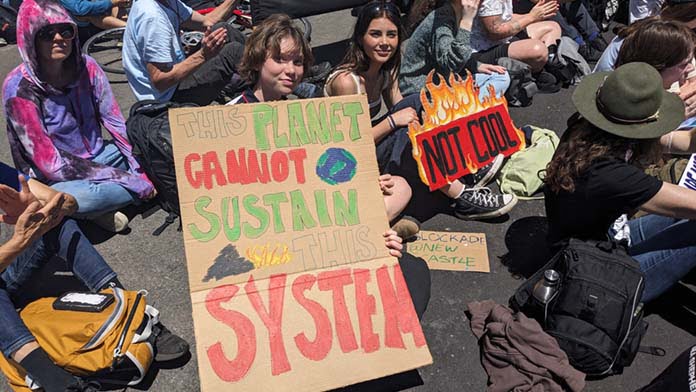A stark warning from the UN has revealed the world is on track for a “hellish” three degrees of warming this century.
This year has already been the hottest for 125,000 years, with sea ice and water temperature readings off the charts.
A bushfire destroyed 18 homes in the northern suburbs of Perth in late November as temperatures hit 39 degrees.
This comes in the lead-up to this year’s COP28 global climate summit, which farcically is being hosted by the petro-state of United Arab Emirates.
The Albanese government is fully behind efforts by the coal and gas companies to keep opening new projects.
The latest demonstration was their Sea Dumping Bill, which eventually sailed through the Senate with Liberal support, after Labor’s Penny Wong told them voting it down would mean, “You said ‘no’ to Santos … ‘no’ to Woodside … ‘no’ to Inpex.” This was a giveaway on what the bill was all about—and Labor’s priorities.
It is designed to allow the export of carbon dioxide from Australia to other countries so it can be buried using failed carbon capture and storage (CCS).
This “is a trojan horse to facilitate new fossil fuel projects in general and one gas project in particular—Santos’s massive new Barossa project off Darwin”, as Ebony Bennett of the Australia Institute explained.
Santos wants to bury carbon dioxide released during mining in the depleted Bayu-Undan gas field beneath the waters of Timor Leste.
Unless it can do so the project can’t go ahead. The huge $5.8 billion project would be one of the most polluting in the world due to the high carbon dioxide content of the gas deposit.
CCS is little more than a fig leaf for the oil and gas companies to continue polluting in the face of the climate emergency.
After years of development and billions in funding it is still failing. Chevron’s Gorgon gas hub off WA runs the world’s largest CCS project and is a key test of the process.
It has been dogged by failure and after eight years in operation buried just 34 per cent of the carbon dioxide it captured in the year to June.
Global summit
This year’s COP28 talks are being led by Sultan al-Jaber, head of the state-owned Abu Dhabi National Oil Company. It plans to spend $150 billion to increase oil production to five million barrels per day by 2027.
He has paid lip service to climate action, saying the “phase down” of fossil fuels is “inevitable” and “essential”. But he is also promoting fake solutions like CCS and wants fossil fuel bosses to be “included” in the search for climate solutions.
This speaks volumes about why world leaders have continually failed to agree the action needed to avert catastrophe.
The Climate Council has reiterated the need for much higher targets of 75 per cent emissions reduction by 2030 and net zero by 2035. The technology exists to do this. Yet Australia’s renewable energy rollout is still stalling.
Energy Minister Chris Bowen has announced new plans to assist renewables, admitting that the government’s renewable energy for 2030 is in serious trouble.
This is a result of relying on the private sector to fund renewable energy on the basis of whether it can make a profit.
The government says its new “capacity investment scheme” will support nine gigawatts of storage and 23 gigawatts of wind and solar energy in the hope of meeting the target. It will underwrite a minimum price for the power they produce, using government money to ensure companies are paid at least that amount.
This is designed to attract private investment by guaranteeing a minimum return.
The government will also run a tender process to seek the cheapest bids from private companies on the projects. But like other forms of privatisation, this will encourage cost cutting, including on workers’ wages and conditions.
That is not the way to ensure a just transition where workers who move into the renewable energy sector have jobs as well-paid as those in fossil fuels.
Government investment in renewable energy would allow proper planning in the energy system and public control of the power industry.
Public renewables were one of the demands as high school students hit the streets again on 17 November in another School Strike for Climate. It will also be a feature of Sydney’s rally during the COP28 summit. More than 1000 people also joined a blockade of the Newcastle coal port in late November.
In the face of Labor’s inaction we need to step up the protests to demand the end of new coal and gas and the urgent transition that’s necessary.
By James Supple






